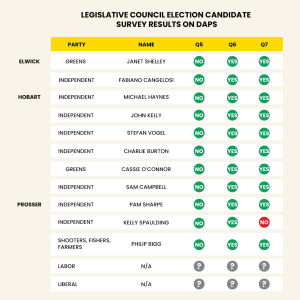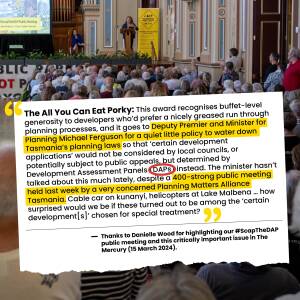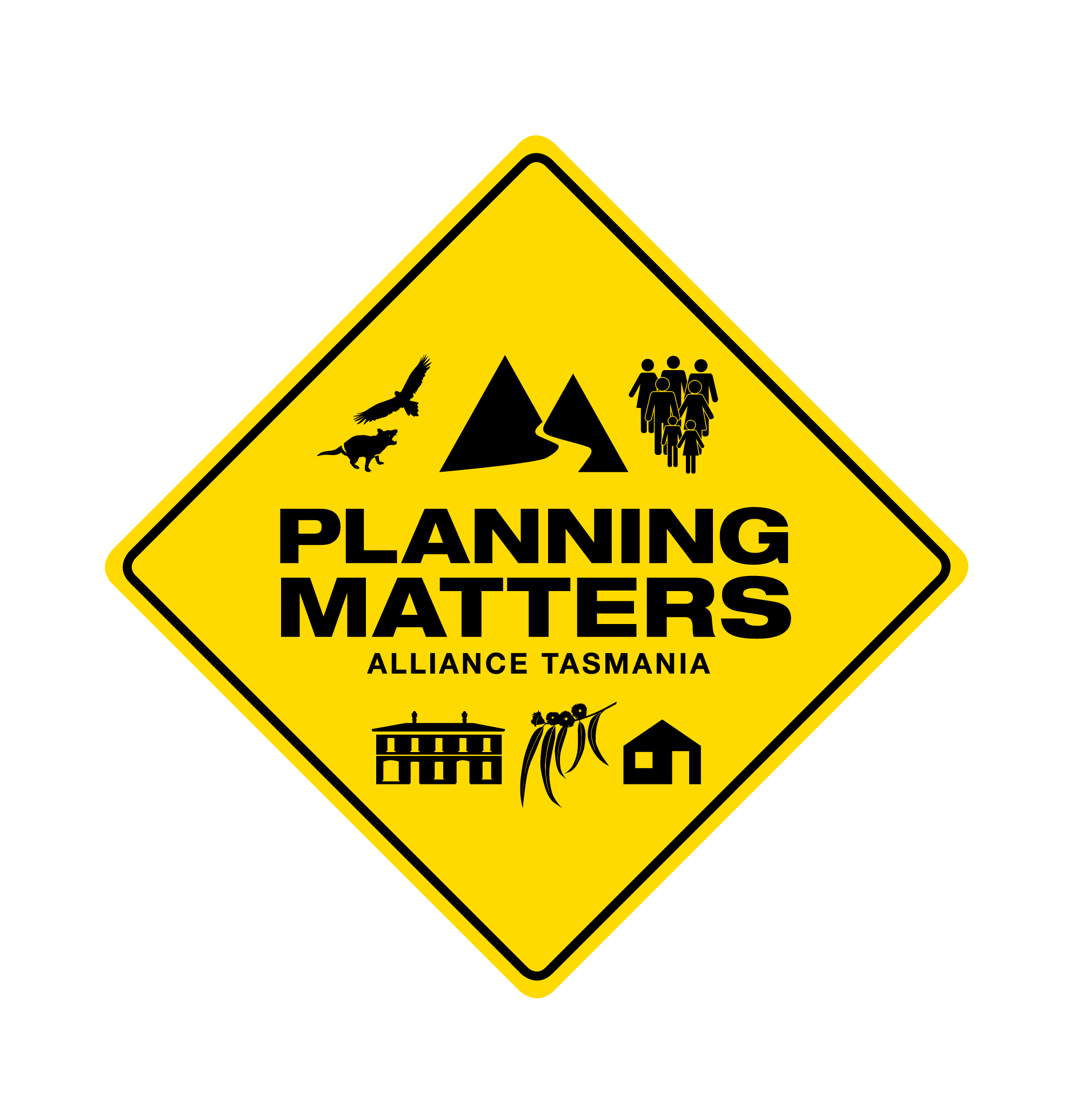- March 5, 2024
- Submission Guide
Submission Guide: Scrap the State Government’s Development Assessment Panel (DAP) for National Parks and Reserves #ScrapTheDap 2024
Media Enquiries
Sophie Underwood
PMAT State Director
sophie_underwood@hotmail.com
0407 501 999
Please share:
Scrap the State Government’s Development Assessment Panel (DAP) for National Parks and Reserves #ScrapTheDap
Make a submission to say no to the DAP for reserved land (Due Friday 8th March 2024, 11:59 pm)
The State Government is proposing a developer friendly development assessment and approval process for World Heritage Areas, National Parks and other Reserves.
The proposed new ‘Statutory Environmental Impact Assessment Process’ for reserves will enable developers to ask the Minister for Parks to take developments out of the normal planning and environmental assessment process and be given to a Development Assessment Panel (DAP).
The DAP has all the power to assess and approve a development and can even change the management plan rules. Local councils will be removed from the approval process and the community’s right to appeal the decision is removed.
The government is responding to the concerns of the development lobby who want a system that will guarantee their developments are approved even in World Heritage Areas, National Parks and other Reserves.
The developments that will be fast-tracked could include large tourism developments, wind farms, transmission lines and even government proposals such as the Tyndall Range huts.
Submission to the proposed ‘Statutory Environmental Impact Assessment Process’ for reserve land:
I oppose the proposed Development Assessment Panels (DAPs) for National Parks and other public reserves, for the following reasons:
Merits appeal rights removed: The community will have no right to merits-based appeals over the DAP’s approval of major developments in National Parks and other reserves. The community’s right to merits-based appeals, particularly with developments in National Parks and other public Reserves, is paramount and must not be taken away. Merit based planning appeals are appeals based on the impacts of a development e.g. on natural and cultural values, recreational enjoyment and height, bulk, scale, density, or appearance of buildings.
Destruction of reserved land: The fast-track DAP process will result in more developments and more destruction in the World Heritage Area, National Parks and other public reserves.
Resurrection of failed developments: Tourism developments that have been refused (Cataract Gorge gondolas in Launceston) or have had trouble getting approval and have been delayed (Lake Malbena and Rosny Hill tourism developments) could be resurrected under the proposed new DAP system and be guaranteed approval.
Resurrection of the kunanyi/Mount Wellington cable car: The Government has not specially flagged the kunanyi Mt Wellington cable car but nor has it ruled it out being resurrected under this new fast-track DAP process. If assessed under the new process the Hobart City Council would not be the planning authority, being replaced by the DAP. The DAP’s approval of the cable car could not be appealed based on the environmental and cultural impacts.
Management plan rules changed to suit developers: Under the new DAP system, the rules in reserve management plans, that we have relied on to stop inappropriate developments, will mean nothing. Developers will be able to submit combined development proposals and management plan amendments, giving them a special process designed to change the rules to suit their preferred development. The changes to management plans, once approved by the DAP, cannot be challenged through an appeal.
We cannot rely on the Federal Government:
These changes could lead to the State Government approving all developments, threatening world heritage values and other nationally protected natural and cultural values. The State Government would leave it to the Federal Government to decide whether developments can go ahead, which is taking too big a risk with World Heritage and other nationally important areas.
Ministerial power grab: The Minister for Parks will have greater power, being able to take any large development proposed for reserved land out of the normal assessment process and have it dealt with by the DAPs. Virtually any large development can fit the criteria and could be taken down this developer friendly pathway, giving the Minister enormous power.
DAPs on private land. Across Tasmania, on both public and private land, the Tasmanian Government wants to remove the community’s voice from having a say on the most controversial and destructive developments affecting local communities including developments already refused such as the kunanyi/Mt Wellington cable car, high-rise buildings in Hobart and new developments such as large-scale high-density subdivisions like Skylands development at Droughty Point, the UTAS Sandy Bay campus redevelopment and developments in our National Parks, Reserves and World Heritage Areas. See information on the Planning Matters Alliance Tasmania website here.
Related News & Media

PMAT Survey: What Are Your Legislative Candidates Position on DAPs?
Legislative Council elections are being held on 4 May 2024 in the seats of Elwick, Hobart and Prosser. All 16 candidates across the three

PMAT Submission: Proposed changes to development assessment in National Parks and Reserves + Reserve management planning
Public comment was invited between 11 January – 9 March 2024. We thank the Department of Natural Resources and Environment Tasmania for allowing PMAT to

Opinion Piece: Planning Shift Takes Away Voice of Communities
“The Proposed Development Assessment Panels are a massive step backwards for Tasmania’s transparency and democracy.” The Mercury.

Opinion Piece: “The All You Can Eat Porky” by Danielle Wood
Deputy Premier and Minister for Planning Michael Ferguson for a quiet little policy to water down Tasmania’s planning laws so that ‘certain development applications’ would

Support Us
Receive News & Updates from PMAT
Stay informed on what’s happening locally and statewide within Tasmania, and join our community in advocating to protect Tasmania’s future.